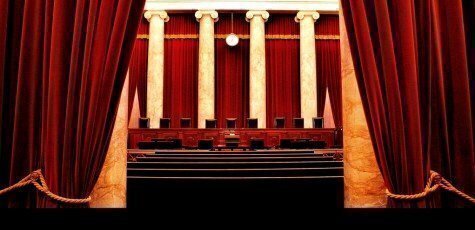Amid a sharp dispute about its power to rule on a new case on same-sex marriage, the Supreme Court refused on Monday to clarify when those couples have a right to government-provided benefits.
 Without explanation, the Justices simply denied review of an appeal by the mayor of Houston, Texas, in a sequel to the Justices’ 2015 decision establishing a constitutional right for gay and lesbian couples to wed. Until such a follow-up case is decided, a nationwide controversy over the full scope of those couples’ legal rights will continue.
Without explanation, the Justices simply denied review of an appeal by the mayor of Houston, Texas, in a sequel to the Justices’ 2015 decision establishing a constitutional right for gay and lesbian couples to wed. Until such a follow-up case is decided, a nationwide controversy over the full scope of those couples’ legal rights will continue.
The Justices on Tuesday will be hearing a major new case on state power to protect same-sex couples from discrimination when they seek goods or services in the marketplace – there, the dispute is over a retail baker’s refusal for religious reasons to create a cake for a gay wedding reception. While the coming decision in that case may help to settle how far religious objections may go to justify denial of equality in commercial dealings, it will not settle what other rights the Constitution itself may guarantee those couples beyond the right to marry.
The denial of review of the new Texas case came in a one-sentence order that provided no explanation. But, as that case had developed in lawyers’ filings, there were several layers of dispute between the two sides on procedural questions about whether the case had reached the Court prematurely. That dispute may well have led the Justices to conclude that this was not a case worthy of review at this stage. No Justices noted a dissent from the order.
The Texas Supreme Court had ruled in the case that the Justices’ two-year-old decision in favor of same-sex marriage equality had not gone further and settled whether, once married, those couples have equal rights to benefits provided by government at any level. That question was sent back to lower state courts to answer, so the case could return to the Supreme Court after that process is finished.
City officials had decided that they would provide equal benefits to city employees who were in a same-sex marriage as they did for employees in opposite-sex marriages. That was challenged by two city taxpayers, and the benefits were blocked while the case went up to the state’s highest court for the ruling that was challenged in the city’s appeal to the Justices.
Gay rights advocacy groups sought to turn the case into a broad reaffirmation of their victory for marriage equality, and they argued that the historic decision in Obergefell v. Hodges had already settled the issue of whether same-sex couples are constitutionally entitled not only to marry, but also to equal access to marriage benefits provided by government. Lawyers for the two Houston taxpayers opposed to city benefits for same-sex married couples argued that the issue was still open but that, in any event, this case was not a proper test of the question.
The Justices have almost complete discretion whether to grant or deny review of cases that reach the Court, and they do not have to explain when they opt not to hear a specific case. They usually do prefer cases that have resulted in a final decision in a lower court. The Houston taxpayers relied heavily on that notion in urging the Justices to let the case play out first in Texas courts.
Legendary journalist Lyle Denniston has written for us as a contributor since June 2011 and has covered the Supreme Court since 1958. His work also appears on lyldenlawnews.com.






